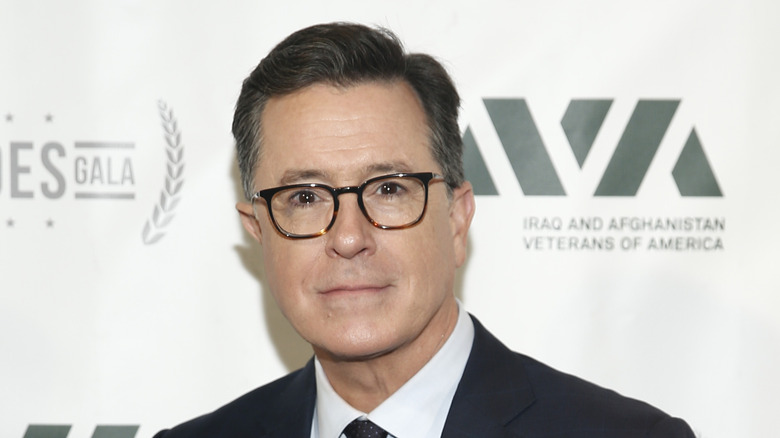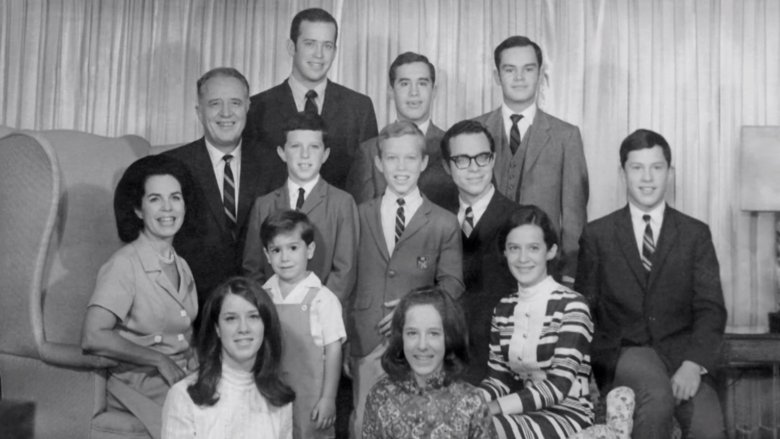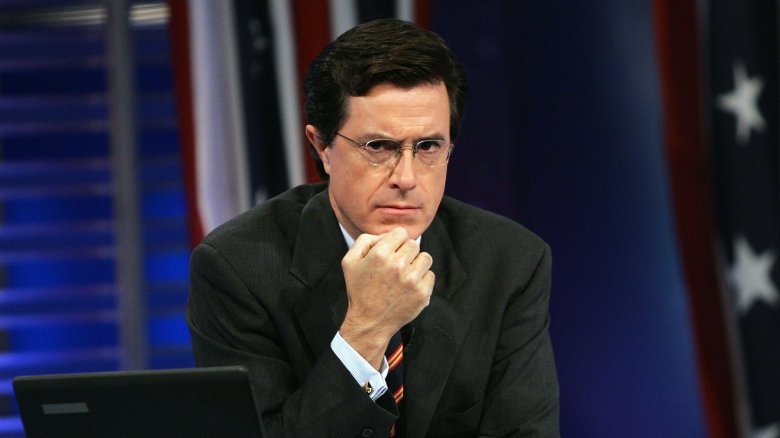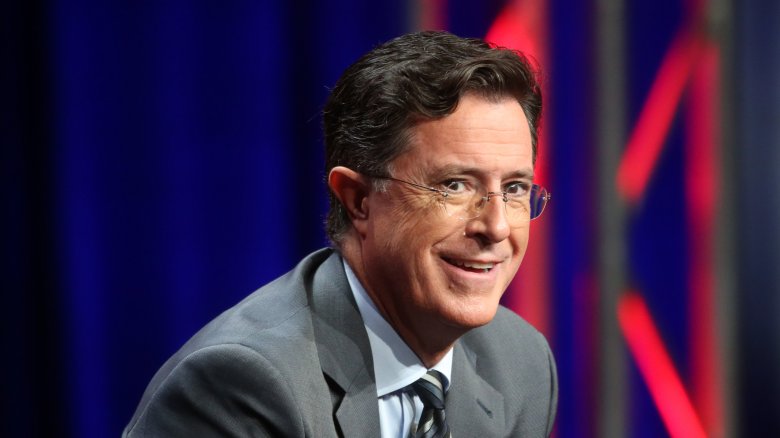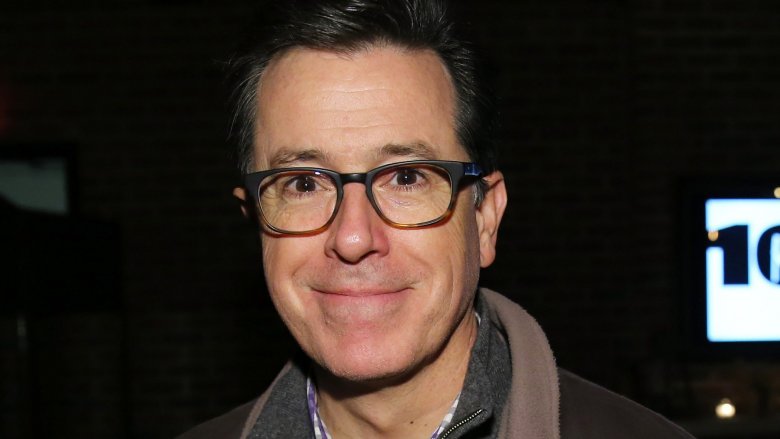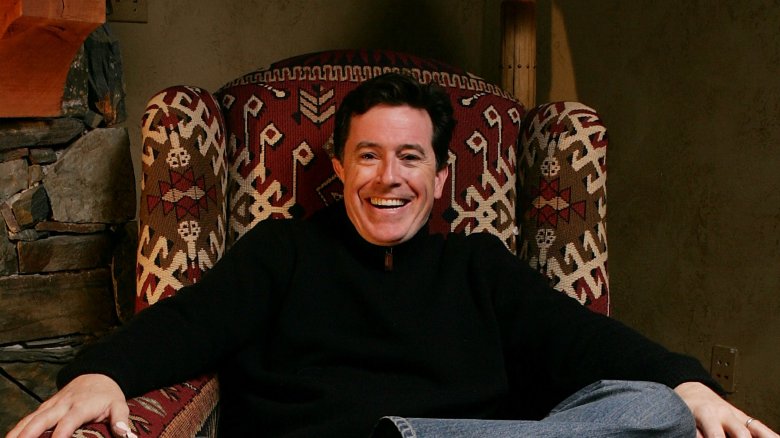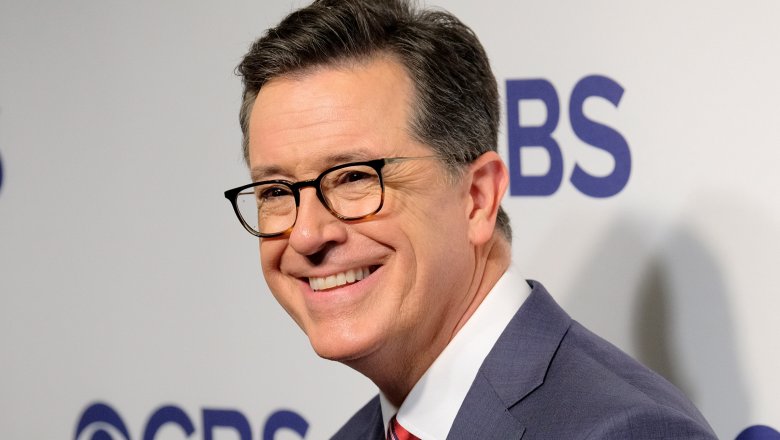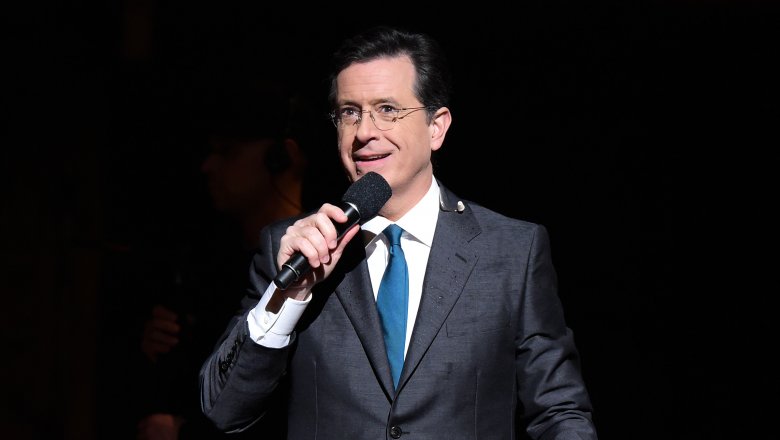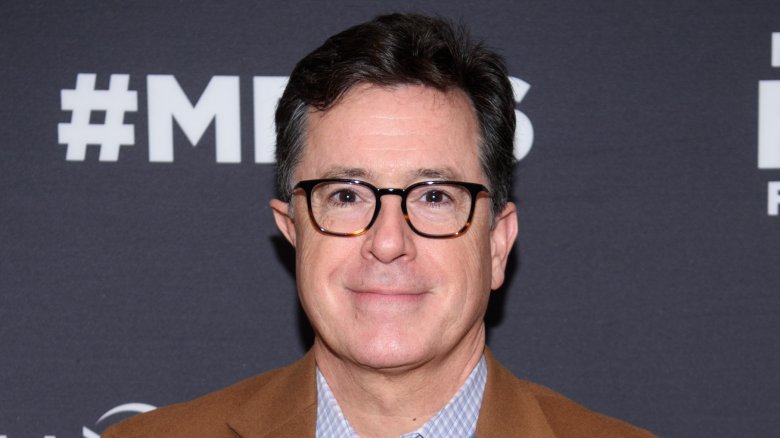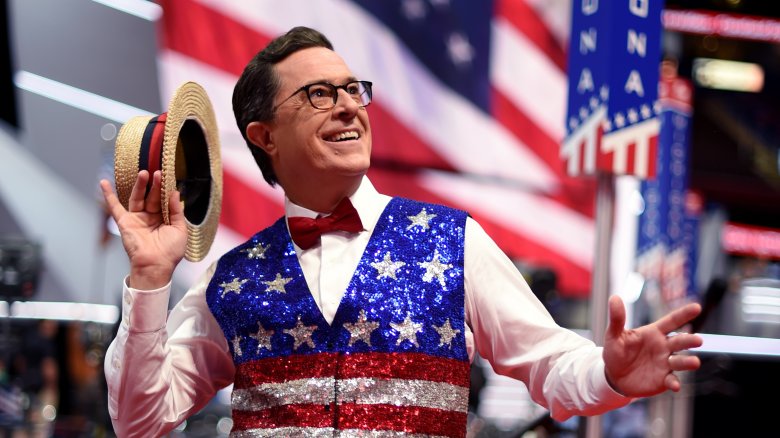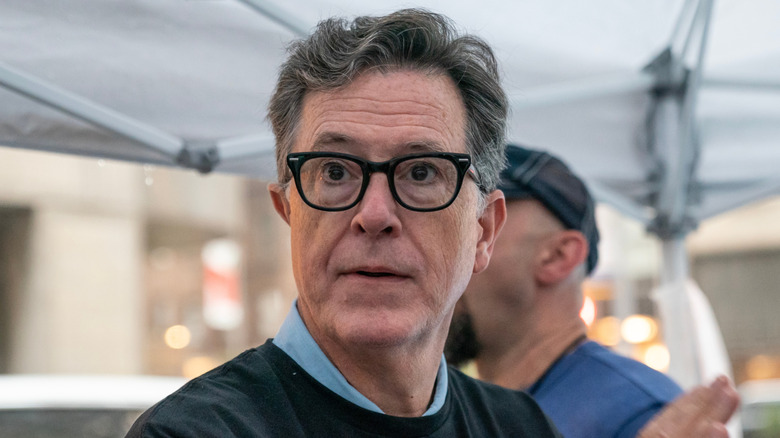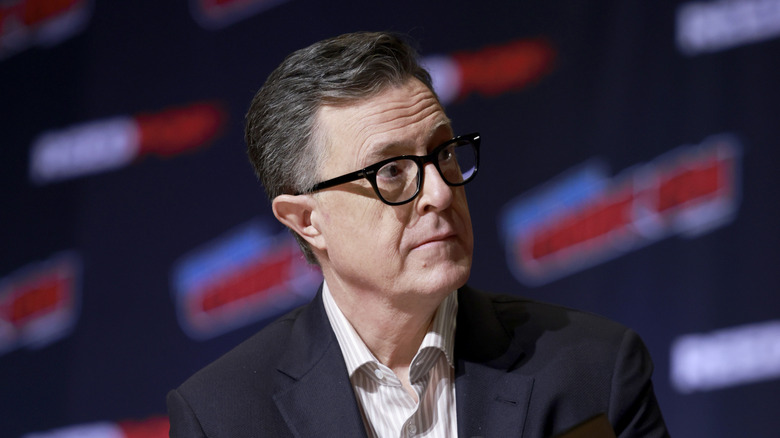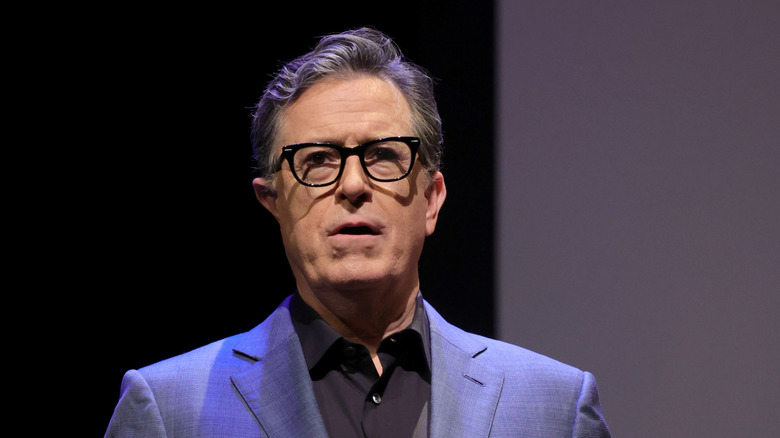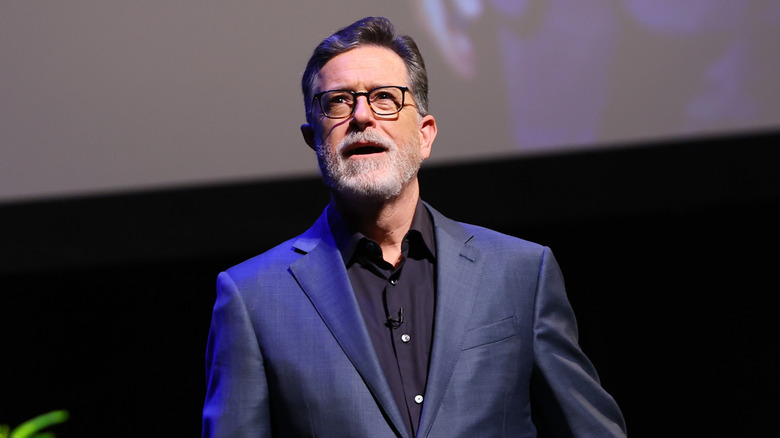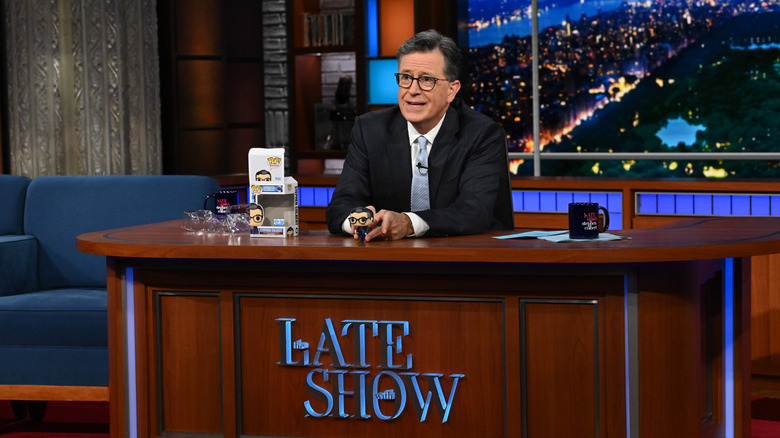Stephen Colbert: His Tragic Real-Life Story
Stephen Colbert has spent decades making his fans laugh, from his earliest days as an improv artist for Second City Chicago to his work role on Comedy Central's "The Colbert Report," to his current tenure as the host of "The Late Show with Stephen Colbert." Beneath the talk show host's signature ability to deadpan and his encyclopedic knowledge of all things J.R.R. Tolkien, though, is a man who has faced incredible tragedy in his personal life.
Colbert — whose last name is actually pronounced "cole-BURT," instead of "cole-BEAR" when he's not in front of the cameras — hails from Charleston, S.C., and he was forced to face some of life's toughest trials at a very young age. He's lost several of his nearest and dearest loved ones in a terrible accident, overcome a crisis of faith, and renewed his role as a thoughtful media icon in an era of political turmoil. Here's what you might not know about Stephen Colbert.
Tragedy struck his family three times as hard
When Stephen Colbert was just 10 years old, his family faced the unthinkable. His father, James Colbert, and teenage brothers Paul and Peter were killed when Eastern Airlines flight 212 crashed in Charlotte, N.C. in 1974. The accident claimed the lives of a total of 72 people, including the Colberts.
Stephen Colbert opened up about the loss on "Oprah's Next Chapter" and told host Oprah Winfrey that the experience influenced how he perceived himself. "For years, I sort of thought that was my secret name. That that loss was my name," he said. "I like the idea that you have a secret name. You have your name but then you have a secret name, and that's a name that no one can ever really pronounce because that's who you are. And there's a magic to your secret name. And that was my secret name, the loss of my father and my brothers."
Colbert spent a lot of his childhood alone
Colbert was the youngest of 11 children to James and Lorna Colbert (via "Oprah's Next Chapter"), and, following the unexpected loss of his father and brothers, the then-10-year-old was left to grow up alone with his grieving mother. He told GQ, "I was left alone a lot after Dad and the boys died. And it was just me and Mom for a long time." However, that constant exposure to her pain taught him how to handle his own suffering. "By her example am I not bitter. By her example. She was not. Broken, yes. Bitter, no," he said.
In fact, Colbert went on to say that his way of handling such heartache was to learn to embrace it. "You gotta learn to love the bomb. Boy, did I have a bomb when I was 10. That was quite an explosion. And I learned to love it," he explained, noting that he grew to "love the thing that I most wish had not happened." Without the company of his father and two brothers, Colbert dedicated much of his free time to reading as a child. "I read a book a day. Spent all of my allowance on books," he shared. "Every birthday, confirmation, Christmas — books, please, stacks of books." Since then, Colbert has proven his bookishness time and time again.
He went into comedy to make his mother laugh
Colbert's love of reading wasn't the only aspect of his adult life that stemmed from spending so much time with his mother. Colbert admitted in an interview with Howard Stern (via People) that lightening his mother's spirits after what she went through was what first drew him to comedy. "I think there's no doubt that I do what I do because I wanted to make her happy," he explained, adding that he had a "strong urge to cheer up a sad woman."
Their relationship, he revealed, was more codependent than most youngsters and their folks. "I was there with my mom, she was there for me, and I sort of kept her going," he said. "Mom and I used to joke that I raised my mom, because at a certain point it had changed her completely and it changed me completely." As close as they were, Colbert noted that she was not a helicopter parent when it came his academic and career choices. He joked to The New York Times, "She said, 'I don't know why, but I'm not worried about you.' I think it was foolish, irresponsible parenting."
The gravity of his loss hit him in college
Although he was 10 when his father and brothers passed away, Stephen Colbert was almost twice that age before the profundity of their deaths would really hit him. On "Oprah's Next Chapter," he admitted, "I didn't really feel the loss until I was in college. Then, ugh, then I was in bad shape. I went into college at about 185 pounds. By the end of my freshman year, I was 135. I was just green. I was just green, just so sad about it."
As for why it took so long for him to feel the weight of what happened, Colbert theorized that it may have had something to do with the fact that he was no longer living at home. "I finally had time to sort of, I suppose, be alone with the idea that they were gone," he told Winfrey. "It seemed like a long time at the time, but now at age 48 ... it seems like the blink of an eye. So, yeah, I got very sad about it."
When Colbert was studying philosophy at Hampden-Sydney College in Virginia, he eventually found something that made him feel better — acting in school plays. As reported by The New York Times, Colbert told himself back then, "You'd be crazy not to take that as a hint. It's the only thing you work hard at." He'd soon pursue that passion elsewhere.
His first experience with theater was like therapy
Colbert eventually transferred to Northwestern University in Chicago to study theater and drama, and he found the experience to be completely cathartic after having a tough two years in school. In an interview with writer-director Judd Apatow (via GQ), he explained, "I was doing Stanislavski and Meisner, and I was sharing my pain with everyone around me. It was therapy as much as it was anything."
Of course, since Colbert continues to operate under something of an alias and has spent so much of his career making light of even the most difficult times in American history by acting wacky before a national audience, he knows he may still be channeling. "Obviously there's something defensive about it," he told GQ of his innate urge to embarrass himself just to prove it doesn't actually hurt anything. "What you're doing is sipping little bits of arsenic so that you can't be poisoned by the rest of your discomfort. You're Rasputin-ing your way through the rest of your life."
He experienced a crisis of faith
Nowadays, Stephen Colbert is a devout Catholic and isn't afraid to share his love of religion with his audience, but there was a time when he almost gave up on religion for good. In a discussion with Faith in Focus, he revealed that, when he was living in Chicago, Ill. shortly after graduating college, he'd given up on the idea of God and he became "convicted of [his] own atheism." Then, he had a chance encounter with a stranger that would shape his future.
"I had lost my faith in God, and to my own great grief that I was sort of convinced that I had been wrong all this time, that I'd been taught something that wasn't true," he explained. "I was walking down the street and someone handed me ... a little green New Testament Proverbs and Psalms." When he opened it, he found an index of verses to turn to in an hour of need, and, when he looked to the suggestions for anxiety, he found exactly what he needed. "I was absolutely immediately lightened. And for the first time, I understood the real meaning of the phrase, 'It spoke to me.' It read off the page ... and I stood on that street corner in the cold and read the sermon. And my life has never been the same." Amen to that.
He has a different view of grief now
The belated impact of his father and brothers' deaths may have hit him like a ton of bricks at the time, but he's since come to experience grief in an entirely different way. He told Playboy magazine (via EW), "Grief is its own thing. It's not like it's in me and I'm going to deal with it. It's a thing, and you have to be OK with its presence. If you try to ignore it, it will be like a wolf at your door."
He credits his mother with informing his perception. "I'm not bitter about what happened to me as a child, and my mother was instrumental in keeping me from being so," he told The New York Times. "She taught me to be grateful for my life regardless of what that entailed. ... What she taught me is that the deliverance God offers you from pain is not no pain — it's that the pain is actually a gift. What's the option? God doesn't really give you another choice." That lesson would later come in handy when he had to deal with yet another tough loss later in life.
He worked through the pain of his mother's death
In 2013, Colbert lost his mother, Lorna, who'd passed at 92. He had taken some time off from The Colbert Report to be with her in her final days (via the New York Daily News). When he returned to his show following her funeral, he broke character, hitting pause on his depiction of the zany, far-right talk show host that he'd been portraying since The Daily Show and delivered a tearful monologue in tribute to her.
He first attributed his success to his mom, saying, "When you watch this show, if you also like me, that's because of my mom." He then detailed her past and how it had influenced him. "She had trained to be an actress when she was younger, and she would teach us how to do stage falls by pretending to faint on the kitchen floor. She was fun," he recalled. Colbert went on to talk about how she overcame the hardship of losing her loved ones, and added that, in his last conversation with her, she could only remember a child's prayer she used to tell his siblings at bedtime. "Her favorite memory of prayer was of a young mother tucking in her children. We were the light of her life, and she let us know it 'til the end." Colbert concluded his speech by stating that his mother wanted him to keep working, and, with that, he continued the episode.
The show must go on
Stephen Colbert finally stepped away from his Comedy Central show after 11 seasons in 2014, and part of the reason was that he believed his work lampooning the most indelicate political persuasions was no longer needed. He told GQ at the time, "I no longer felt that that model served to address the national mood," adding, "We're in a different place now." He explained, "We can stop freaking out that the guy's middle name is Hussein."
However, after joining The Late Show, he quickly found himself toeing the waters of politics again in the wake of Donald Trump's presidential election, and he admitted he was wrong about the state of the union. "I said that we had moved beyond the constant cycle of anger. And I was hoping that was true. But it might just have been complacency," he told Rolling Stone. "And now there's no denying that we're still in the constant cycle of anger, and we're at an emotional 10 at all times." With that, all his experience helping himself and his mother cope continues to remain relevant as he offers some much-needed stability to his fans watching him from their TV screens.
He's struggled with anxiety so severe he required medication
Ever since taking over as host of "The Late Show," from late-night legend David Letterman, Stephen Colbert has been candid about his past struggles. That was certainly the case when he opened up to Rolling Stone about the crippling anxiety he'd experienced years earlier. According to Colbert, it peaked shortly after he married his wife, Evelyn, in 1993. "I had a bit of a nervous breakdown after I got married — kind of panic attacks," he explained.
At the time, his career had yet to take off the way it would, and he grew increasingly nervous about whether it ever would. "My wife would go off to work and she'd come home ... and I'd be walking around the couch," he shared, recalling that she'd return home after work and ask how his day had been. "And I'd say, 'You're looking at it.' Just tight circles around the couch," he continued.
Relief came with a Xanax prescription, which he took for just nine days before realizing the drug wasn't actually quashing his anxiety, just masking it. "Xanax was just lovely. You know, for a while. And then I realized that the gears were still smoking ..." he added. It was performing in front of an audience that actually lessened his anxiety. "Like, 'Oh, you feel fine when you're out here.' And then as soon as I got offstage, I'd just crumble into a ball again," he recalled.
Stephen Colbert has experienced multiple health struggles
In 2023, while taping two back-to-back episodes of "The Late Show," Stephen Colbert was not feeling great. As the taping continued, he felt progressively worse. "I was not aware of the amount of trouble I was in," he told viewers a few weeks later, after he'd returned to the show.
He'd been experiencing intense abdominal pain all day, but had powered through it. By the time he'd finished taping those episodes, he felt as if he was dying — and he was, because, unbeknownst to Colbert, his appendix had ruptured. He was rushed to a hospital and underwent emergency surgery. "They said when they opened me up, it was like they'd shot 'John Wick 5' down there," he continued, joking about the internal carnage his surgeons encountered. His appendix was removed, and he ultimately made a full recovery — although he'd lost 14 pounds due to blood poisoning. "Appendicitis is the new Ozempic," he joked.
That wasn't the only time he'd experienced a health crisis. A few years earlier, in 2020, he'd been diagnosed with benign positional vertigo, which caused dizziness and played havoc with his balance. "It's almost entertaining, until I forget. And then I go to stand up, and then I just fall down," he told Vanity Fair, revealing he'd been prescribed a regimen of exercises to keep his symptoms at bay.
He revisited the grief he experience as a 10-year-old in an interview with Anderson Cooper
The tragic loss of his father and brothers when he was just 10 has continued to resonate with Stephen Colbert throughout his life. That childhood trauma, in fact, was the focus when he joined CNN news anchor Anderson Cooper for his "All There Is" podcast in 2022.
As Colbert explained, revisiting that loss led him to realize how much it had molded him, and continued to do so in middle age. Looking back, he revealed he'd come to comprehend the extent to which that event had altered him, irrevocably. "My awareness of the world changed," he said. "My emotional life changed. My relationship with my mother changed."
It wasn't until he became a father himself that Colbert would find himself unexpectedly struck by grief, often in the midst of joyful moments while playing with his kids. "Well, since my father, my brothers died when I was 10, when my kids were younger, it would hit me at unexpected moments," he said. In fact, he realized that how he perceived life and death were different than most people after the birth of his first child; holding his newborn daughter in his arms, he instantly became aware of her mortality. "The first thing that occurred to me was, How beautiful and how wrong that this will ever end," he observed.
He came to realize that the 'gift' of existence is accompanied by suffering
During his appearance on Anderson Cooper's podcast, Stephen Colbert also shared the flip side of how he'd been impacted by the death of his father and brothers: he felt true gratitude for being alive.
"It's a gift to exist. And with existence comes suffering," Colbert said, admitting that if one experiences gratitude for being alive, one must also be grateful for all that encompasses, which is the sad fact that all lives will eventually end.
Ultimately, the experience left him with a deeper-than-usual empathy for what others might be going through. "I suffered something so that by the time I was in serious relationships in my life with friends or with my wife or with my children, is that I have some understanding that everybody is suffering and however imperfectly, acknowledge their suffering and connect with them and to love them in a deep way that makes you grateful for the fact that you have suffered so that you can know that about other people," he explained.
The Late Show was cancelled amid a controversial corporate merger
By the time that Donald Trump was elected president of the U.S. for a second time, Stephen Colbert had established himself as one of Trump's most vocal — and most hilarious — critics. Colbert's mockery clearly got under Trump's skin; in September 2024, Trump issued a social media post (via The New Republic) describing Colbert as a "complete and total loser," urging CBS to "terminate his contract ..."
Less than a year later, CBS did just that. In the midst of the fraught sale of Paramount (parent company of CBS), the network announced that it would not be renewing Colbert's contract when it expired in May 2026. In a statement to CBS News, the network insisted that firing Colbert, and then ditching the "Late Show" entirely, was "purely a financial decision against a challenging backdrop in late night" — and had nothing to do with "content or other matters happening at Paramount," presumably referencing speculation that Colbert's criticism of CBS News settling a Trump-filed lawsuit was appeasement to prevent the Trump administration from quashing the deal. However, it was difficult not to connect the dots when, just a few days after the announcement of Colbert's firing, the Federal Communications Commission approved Skydance Media's acquisition of Paramount.
Colbert did not mention any of that when breaking the news to the audience in the Ed Sullivan Theater that night. "I'm not being replaced — this is all just going away," he said.

